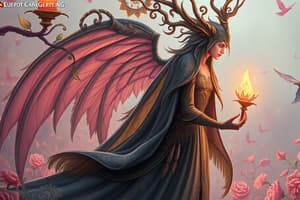Podcast
Questions and Answers
What is the origin of the term 'magick'?
What is the origin of the term 'magick'?
- Ancient Greek
- Egyptian
- Old Persian (correct)
- Latin
What type of magick focuses on achieving practical results?
What type of magick focuses on achieving practical results?
- Hermeticism
- Goetia
- Theurgy
- Thaumaturgy (correct)
What is the power of the individual's intention and desire to shape reality?
What is the power of the individual's intention and desire to shape reality?
- Energy
- Will (correct)
- Ritual
- Imagination
What is the name of the system of magick developed by Aleister Crowley?
What is the name of the system of magick developed by Aleister Crowley?
What is the term for the subtle forces that flow through the universe and can be harnessed for magical purposes?
What is the term for the subtle forces that flow through the universe and can be harnessed for magical purposes?
What is the modern pagan religion that incorporates elements of witchcraft and magick?
What is the modern pagan religion that incorporates elements of witchcraft and magick?
What is the type of magick that involves the invocation of demons or spirits to achieve specific goals?
What is the type of magick that involves the invocation of demons or spirits to achieve specific goals?
What is the criticism of magick that argues its claims are not supported by empirical evidence?
What is the criticism of magick that argues its claims are not supported by empirical evidence?
Flashcards are hidden until you start studying
Study Notes
Definition and History
- Magick is an archaic spelling of the word "magic" that is often used to distinguish it from stage magic or illusionism.
- The term is derived from the Old Persian word "maguš," which refers to a priest or wise man.
- Magick has its roots in ancient cultures, including Egypt, Greece, and Rome, where it was associated with spiritual and religious practices.
- In the Middle Ages, magick was often linked to witchcraft and heresy, leading to persecution and suppression.
Types of Magick
- Theurgy: a type of magick that aims to attain spiritual enlightenment and union with the divine.
- Thaumaturgy: a type of magick that focuses on achieving practical results, such as healing or divination.
- Goetia: a type of magick that involves the invocation of demons or spirits to achieve specific goals.
Key Concepts
- Will: the power of the individual's intention and desire to shape reality.
- Imagination: the faculty that allows the magician to visualize and manifest their desires.
- Energy: the subtle forces that flow through the universe and can be harnessed for magical purposes.
- Ritual: a formalized ceremony or practice that is used to focus the will and channel energy.
Notable Practitioners and Systems
- Aleister Crowley: a British occultist who developed the system of Thelema, which emphasizes individual liberty and the pursuit of one's true will.
- Wicca: a modern pagan religion that incorporates elements of witchcraft and magick.
- Hermeticism: a philosophical and spiritual system based on the teachings of the ancient Greek philosopher Hermes Trismegistus.
- Chaos magic: a modern approach to magick that emphasizes flexibility, experimentation, and individual creativity.
Criticisms and Controversies
- Skepticism: many people view magick as superstition or fantasy, and argue that its claims are not supported by empirical evidence.
- Danger and ethics: some critics argue that magick can be harmful or dangerous, particularly if it involves manipulating or coercing others.
- Cultural appropriation: some practitioners of magick have been accused of borrowing and exploiting elements from other cultures without proper understanding or respect.
Definition and History
- Magick is a distinct term from stage magic, derived from the Old Persian "maguš", meaning priest or wise man.
- Ancient cultures, such as Egypt, Greece, and Rome, practiced magick as part of spiritual and religious rituals.
- During the Middle Ages, magick was linked to witchcraft and heresy, resulting in persecution and suppression.
Types of Magick
- Theurgy aims to attain spiritual enlightenment and union with the divine.
- Thaumaturgy focuses on achieving practical results, like healing or divination.
- Goetia involves invoking demons or spirits to achieve specific goals.
Key Concepts
- Will refers to the individual's intention and desire to shape reality.
- Imagination is the faculty that allows visualization and manifestation of desires.
- Energy refers to subtle forces that flow through the universe and can be harnessed for magical purposes.
- Rituals are formalized ceremonies that focus the will and channel energy.
Notable Practitioners and Systems
- Aleister Crowley developed Thelema, emphasizing individual liberty and the pursuit of one's true will.
- Wicca is a modern pagan religion incorporating elements of witchcraft and magick.
- Hermeticism is a philosophical and spiritual system based on the teachings of Hermes Trismegistus.
- Chaos magic emphasizes flexibility, experimentation, and individual creativity.
Criticisms and Controversies
- Skeptics view magick as superstition or fantasy, lacking empirical evidence.
- Critics argue that magick can be harmful or dangerous, particularly if it involves manipulating or coercing others.
- Some practitioners have been accused of cultural appropriation, borrowing and exploiting elements from other cultures without proper understanding or respect.
Studying That Suits You
Use AI to generate personalized quizzes and flashcards to suit your learning preferences.




